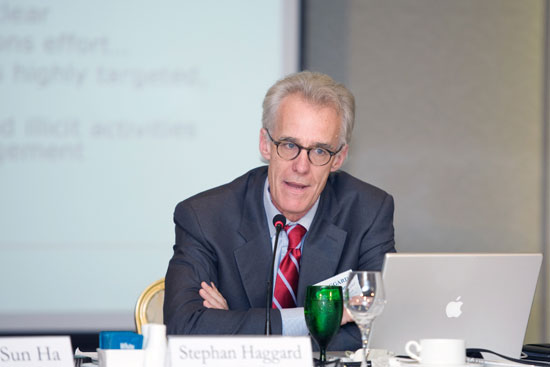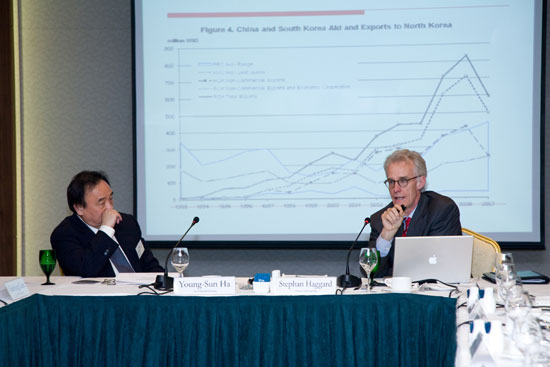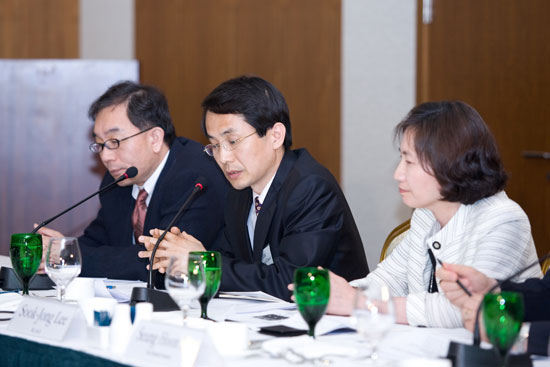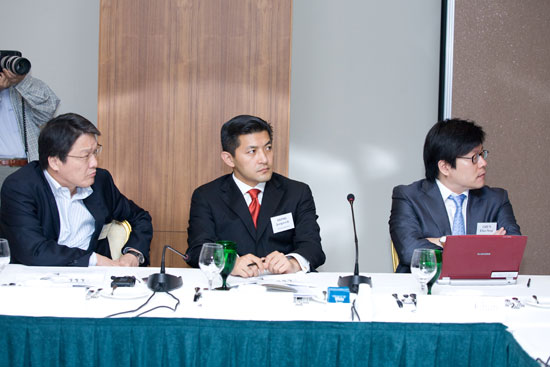행사
EAI는 Stephan Haggard (University of California, San Diego) 교수를 초청하여 "North Korea Opens: Recent Economic Developments in the DPRK"를 주제로 제 16차 지구넷 21 포럼을 6월 24일 국도호텔 Tulip A실에서 개최하였습니다. 본 포럼에는 하영선 교수(서울대)의 사회와 지정토론자인 이근(서울대 국제대학원), 전재성(서울대), 홍정욱(국회의원), 임병철(통일부)를 포함하여 총 20분이 전문가들이 참석하여 열띤 토론을 벌였습니다.
Program
16:00~16:10 Registration
16:10~16:40 “North Korea Opens: Recent Economic Developments in the DPRK”
16:40~17:20 Designated Discussion17:20~18:30 Question and Answer Session
18:30~19:30 Dinner
회의내용 요약
Presentation
The great famine of the mid-1990s led to the collapse of the PDS (Public Distribution System). This state failure caused a forced “marketization from below” in the country. Thus, the economic transformation was not the result of a top-down reform, but an unintended response to the state failure. However, in the post-famine era, the regime undertook a major “reform in reverse” effort: the control of the food economy, mainly by banning private trade in grain and reviving the PDS; the management of the border trade; the restrictive response of the government to the development of markets, etc.
Nonetheless, North Korea has in fact become more economically open, and FDI has played an increasing role in financing North Korea’s current account deficit over time. Much of its trade is with China although it also has growing trade with the Middle East. The fact that China’s share of imports and exports has expanded greatly to almost 50% implies how dependent North Korea is becoming on China. While trade across the Chinese border has been increasingly commercial in form, South Korea’s trade with North Korea has been less commercial in nature.
Although the implications of these developments are not clear for now, it is certain that China has become more significant to any effective sanctions effort. North Korea’s growing ties and links with the Middle East implies that it is more open but this is limited to countries that are unlikely to exert pressure or demands on the country. Economic inducements are difficult unless highly targeted.
Panel Discussion/Q&A
Key findings from the active panel discussion are as follow:
• North Korea’s imminent problem now is the succession issue, and it is essential for resolving the nuclear crisis. Although the pattern of the recent nuclear test with the last nuclear test is different, finding a solution may not be all that different. What is clear is that a tough tactic won’t work. We have seen from the past that North Korea can endure that.
• It is important to understand the intent of North Korea so that you can apply the correct policy. Neither unconditional support nor reciprocal support will work. With the Vision 3000 model there are three main problems; 1) a mismatch of priorities; 2) the wrong process order; 3) lack of realistic targets.
• The North will not change its system and will use all its resources to deal with the current crisis. The new sanctions will enhance its relations with China.
• We should view the contacts with North Korea from a broader perspective. And it is important to have grand visions on how to deal with North Korea. But the most important aspect is how to get negotiations started.
• Whatever North Korea’s intentions are, it would not be interested in anything that could threaten its political control. So far, North Korea has not been interested in any of the benefits handed to them.
• The stability of the North Korea regime may refers to less incidents of social protest. North Koreans respond to coercion by going into the market instead of social protest. Therefore, the “marketization” was a quasi-political response to the state failure.
• We may expect not a “change in regime” but a “change in the behavior of the regime.” So what we are seeking is a change in behavior and character and this is what the Sunshine Policy was aiming for.
발표자 : Prof. Stephan Haggard(UCSD)
사회자 : 하영선 지구넷 21 포럼 위원장(서울대 외교학과 교수)
주 제 : "North Korea Opens: Recent Economic Developments in the DPRK"
지정토론자
이 근, 서울대학교 국제대학원
전재성, 서울대학교
홍정욱, 국회의원
임병철, 통일부
토론자
강명구, Claremont Mckenna College
김병국, 고려대학교
김병연, 서울대학교
박형중, 통일연구원
신성호, 서울대학교
이동휘, 외교안보연구원
이숙종, EAI 원장
이승훈, 서울대학교
이용욱, 고려대학교
이호철, 인천대학교
정헌주, Indiana University
황지환, 명지대학교
Thomas Kalinowski, 이화여자대학교



